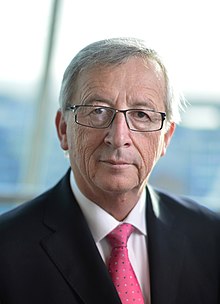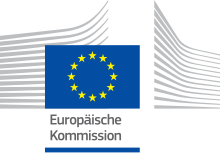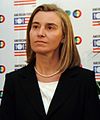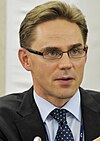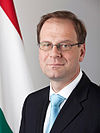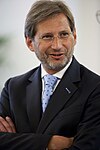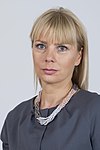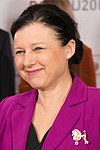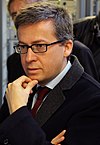Juncker Commission
The Juncker Commission started its work on November 1, 2014 as the successor to the Barroso II Commission . It is the first European Commission to have lead candidates for the office of EU Commission President in the European elections. In addition to the President, the Commission has 27 commissioners. It is headed by Jean-Claude Juncker from Luxembourg . For the first time, the new commission is divided into clusters , in which a vice-president of the commission heads a certain field of activity, to which several commissioners belong and whose areas fall into the respective cluster.
The European Parliament approved the changed appointments on October 22nd. At the hearings, which began on September 29, 2014, not all of the proposed commissioners were accepted. Shortly afterwards the Commission was also confirmed by the Council.
The term of office officially ends on October 31, 2019. For the follow-up commission , Ursula von der Leyen was elected President of the European Commission on July 16, 2019 on the proposal of the European Council by the European Parliament .
Choice of commission
Juncker's election
In the 2014 European elections , Jean-Claude Juncker ran as the top candidate of the conservative EPP . His competitors were for the social democratic PES EU Parliament President Martin Schulz , from the liberal ALDE Guy Verhofstadt and EU Economic and Monetary Affairs Commissioner Olli Rehn , from the European Greens the EGP Ska Keller and José Bové and from the left EL Alexis Tsipras .
The EPP became the strongest force in the EU Parliament with 221 seats.
In the run-up to Juncker's nomination by the European Council , there was widespread controversy between the heads of government of the member states, as both the British David Cameron and the Hungarian Viktor Orbán rejected a top candidate from the most successful European party in the election. During the controversy, Juncker's main competitor in the EU parliamentary elections, Martin Schulz, publicly stood behind him, and both Conservatives and Social Democrats, Socialists, Greens and Liberals in the EU Parliament announced that they would not accept any candidate other than Juncker.
EU Council President Herman Van Rompuy has been tasked with negotiating between the European Council and the EU Parliament. Finally, Juncker was nominated by the European Council for the office of President of the EU Commission. In this nomination, Great Britain, for the first time in the history of the EU, voted against the jointly nominated candidate.
In the election by the European Parliament, 422 MPs voted for Juncker, 250 against him, 47 abstained, 10 votes were invalid and 22 MPs did not vote.
Nomination and hearings of the commissioners
Before the European elections, Juncker said he would like 40% women in his commission. However, the nominations of the member countries did not meet his wishes; Juncker was finally satisfied with maintaining the status quo (9 Commissioners). Even that quota was difficult to achieve - by August 31, only two of the 27 states had proposed women. According to the Lisbon Treaty , only two thirds of the member states could have appointed a commissioner, which the European Council postponed for the time being. The commission was not reduced in size, which is why Juncker came up with the principle of clusters (see below).
On August 30, after lengthy discussions, the Council of Heads of Government nominated Federica Mogherini as EU foreign representative. This cleared the way for the remaining commissioner posts to be allocated.
Juncker's Commission proposal was finally presented on September 10, 2014, and the candidates were available to parliament for questions and answers from September 29. Some candidates were particularly criticized: Pierre Moscovici because of his policy as French finance minister, Tibor Navracsics because of the media laws in Hungary , Jonathan Hill and Miguel Cañete because of suspected incompatibilities and Alenka Bratušek because of their ignorance in their field, as confirmed by the MPs, as well as their undoubtedly problematic self-nomination .
Bratušek, who was rejected by the responsible parliamentary committee on October 8th with a large majority, announced her resignation one day later. While the PES hoped that Slovenia would nominate the social democratic Tanja Fajon , the head of government pushed through the liberal Violeta Bulc . Tibor Navracsics was also at least rejected by the Culture Committee, but according to the MEPs he was able to take on another portfolio in the Commission.
Members of the Commission
The following table lists the members of the Commission. Currently (as of June 2017) six commission members have the rank of Vice-President .
| The colors show the affiliation to the European parties:
|
Cluster
A certain degree of hierarchy should be established among the Vice-Presidents and the other commissioners. For this purpose, each of the originally seven Vice Presidents was assigned a “project team”. These project teams are supposed to steer and coordinate the work of several commissioners. Any initiative by a Commissioner should require the support of a Vice-President to feed into the Commission's work program. On the other hand, the commissioners are supposed to “work” on the vice presidents within the teams in order to advance the defined projects.
The topics are:
- Jobs, growth, investment and competitiveness
- Digital single market
- Energy Union and climate protection
- Budget and staff
- Euro and social dialogue
- Foreign and Security Policy
- Better regulation issues, inter-institutional relations and the rule of law
The project teams are divided into members of the respective core team and members who are called in if necessary. Timmermans' teams for Better Regulation, Inter-Institutional Relations and Rule of Law, and Georgieva for Budget and Staff, each include all Commissioners. Günther Oettinger took over the budget and human resources department from Georgieva in 2017, but was not appointed Vice President. The other clusters are occupied as follows:
Digital single market
Vice President: Andrus Ansip
| Member of the core team | Member of the needs team |
|---|---|
| Elżbieta Bieńkowska | Vytenis andriukaitis |
| Corina Crețu | Valdis Dombrovskis |
| Phil Hogan | Carlos Moedas |
| Věra Jourová | Tibor Navracsics |
| Pierre Moscovici | Margrethe Vestager |
| Günther Oettinger | |
| Marianne Thyssen |
Euro and social dialogue
Vice-President: Valdis Dombrovskis
| Member of the core team | Member of the needs team |
|---|---|
| Elżbieta Bieńkowska | |
| Corina Crețu | |
| Věra Jourová | |
| Pierre Moscovici | |
| Tibor Navracsics | |
| Marianne Thyssen |
Jobs, growth, investment and competitiveness
Vice President: Jyrki Katainen
Energy Union and climate protection
Vice-President: Maroš Šefčovič
| Member of the core team | Member of the needs team |
|---|---|
| Elżbieta Bieńkowska | Věra Jourová |
| Miguel Arias Cañete | Cecilia Malmström |
| Corina Crețu | Günther Oettinger |
| Phil Hogan | Pierre Moscovici |
| Karmenu Vella | Marianne Thyssen |
| Carlos Moedas | Margrethe Vestager |
| Violeta Bulc |
Foreign and Security Policy
Vice President: Federica Mogherini
| Member of the core team | Member of the needs team |
|---|---|
| Johannes Hahn | Dimitris Avramopoulos |
| Cecilia Malmström | Miguel Arias Cañete |
| Neven Mimica | Violeta Bulc |
| Christos Stylianides | Julian King |
Political guidelines
- Jean-Claude Juncker: “ A new start for Europe: My agenda for jobs, growth, fairness and democratic change ”. “Policy guidelines for the next European Commission”, Strasbourg, July 2014.
Web links
Individual evidence
- ↑ What will a reformed EU Commission look like? In: euractiv.de. EURACTIV.COM Ltd., July 14, 2014, accessed July 5, 2018 .
- ↑ European Parliament voted for the new EU Commission. derstandard.at, October 22, 2014, accessed on October 22, 2014
- ↑ a b The Juncker Commission: A Strong and Experienced Team for Change . European Commission, accessed September 10, 2014
- ↑ a b Questions and Answers: The Juncker Commission. European Commission, September 10, 2014, accessed April 7, 2018 .
- ↑ dpa: EU agrees on climate package , handelsblatt.com, October 24, 2014
- ^ Gregor Peter Schmitz: Miese Quote , Spiegel Online from July 31, 2014, accessed on October 10, 2014
- ↑ Too few women: New EU Commission wobbles , DerStandard.at of July 31, 2014, accessed on October 10, 2014
- ↑ Tusk becomes President of the Council, Mogherini new external representative ( Memento from October 16, 2014 in the Internet Archive ), DerStandard.at, August 30, 2014.
- ↑ Thomas Mayer: EU Parliament rejects Bratusek . Der Standard Online, October 8, 2014
- ↑ Alastair Macdonald, Jan Strupczewski, Barbara Lewis: EU lawmakers reject Hungarian culture nominee, disrupting Juncker plan Reuters, October 6, 2014
- ↑ Junckers 27 commissioners in the overview
